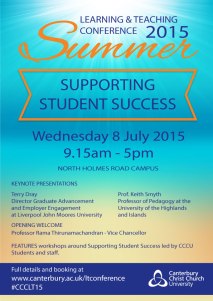On Wednesday 8 July 2015, I attended the Canterbury Christ Church University annual Learning and Teaching Conference focusing on the topic of Supporting Student Success.
The event consisted of a number of fascinating workshops led by University staff & students and keynotes provided by:
Terry Dray, Director Graduate Advancement and Employer Engagement at Liverpool John Moores University
Professor Keith Smyth, Professor of Pedagogy at the University of the Highlands and Islands.
Keynote 1:
During the first keynote presentation ‘Giz a job! – Employability: How hard can it be?’, Terry Dray questioned: “are we [universities] preparing our students for a job or to be employed?”. With growing competition in job markets, the focus is no longer on degree results or the university attended, instead employability skills are key (summarised in the picture below):
Drawing on a number of pieces of research, Terry described the attributes required by today’s graduates and how they can develop ‘personal capital’: https://twitter.com/SusanOdev/status/618708175366324224
In order for students to develop the necessary skills and to succeed in the modern workplace, they must engage early on with university careers services. I was really fascinated to learn about LJMU’s ‘World of Work Programme‘ and how the university was working together with large organisations to develop self awareness, organisational awareness and project management skills.
World of Work Programme at LJMU being discussed by @TerryDrayLJMU#CCCLT15pic.twitter.com/poFhLugy9N
— Keith Smyth (@smythkrs) July 8, 2015
Workshop 1: Developing students’ confidence in making sense of feedback
Led by the University’s Academic Learning Development Team, the session began by playing a board game to explore the student journey and the anxieties associated with it.

The board game provided an interesting and different way to explore the topic and also the services offered by the team.
Continuing to work in small groups, we were asked to consider strategies for developing students’ confidence in making sense of feedback.
What become clear from the session was that although academic staff encourage students to contact them to discuss the feedback further, very few do. Various strategies were discussed including: the holding back of grades until students had reflected/discussed the feedback with their tutor, changing the language of assessment criteria to use more ‘student friendly’ language and also encouraging students to attend one of the many workshops offered by ALD etc.
Keynote 2:
During the second keynote presentation ‘Engaging learners in digital spaces: meeting expectations and supporting transitions’, Professor Keith Smyth described the importance of providing spaces for students to create and engage, and also to aid the transition from one curricula to another i.e. the progression from college/sixth form to university.
Keith introduced the concept of the ‘third space‘ which are spaces – or annexes – that extend our opportunities and can help to bring together those who may never meet. This may be either technological spaces such as VLEs or could include physical spaces such as libraries, cafés etc.
I was fascinated to learn about the TESEP project and the use of the 3 E’s framework (Enhance – Extend – Empower) as a way of empowering students to take responsibility for key parts of their learning, and to experience authentic activities, which reflect the professional environments they will be joining, following the completion of their studies.
I was also interested to hear about the digitally distributed curriculum:
Workshop 2: Cultural factors which impact on student participation in the learning process
Presented by two of the University’s Partners in Learning, the students discussed the detailed research they had undertaken to explore the cultural factors affecting the learning and teaching of first year Business School students.
The factors investigated/observed included:
Although the research was far from complete, the project has been successful in obtaining funding for a second year, to allow the students to fully explore the entire journey of first year students.
Workshop 3: Use of webinars to enhance student learning: help or hinderance
Presented by Holly Harris, Senior Lecturer in Health & Social Care and Manfred Gschwandtner, Faculty Librarian for Health & Wellbeing, the session focused on the use of Blackboard Collaborate to facilitate ‘structured reading groups’ to encourage and improve the academic reading skills of undergraduate students by utilising the social dimensions of learning.
Scheduled as part of the taught sessions, students were divided into five groups (approximately 8 students per group) and met within the dedicated group study spaces housed within Augustine House. Using Blackboard Collaborate, each of the groups connected to the ‘virtual classroom’ where they received instruction from the tutor regarding the reading activity. In the small groups, the students discussed the paper and were able to ask questions to the tutor and the other groups by using the in-built chat functionality. At the end of the session, each group took it in turns to feed back the discussions held.
The workshop provided a useful overview of how the technology can be used to bring together groups of students and facilitate discussions both within small groups and the class overall, whilst being immersed in a rich learning environment offered by the Augustine House Library. The project went beyond the traditional webinar setup of one-to-many (i.e. one person presenting to many users) and instead incorporated a many-to-many approach.
Although the evaluation reports indicated a number of audio problems, these can easily be overcome through the investment in high quality web conferencing microphones and the development of Internet etiquette. For example, releasing the talk button to allow others to talk.
Anecdotally, the tutor reported that the students were accessing more library resources as a result of the session and had also seen a slight improvement in assessment scores, compared to previous cohorts.


